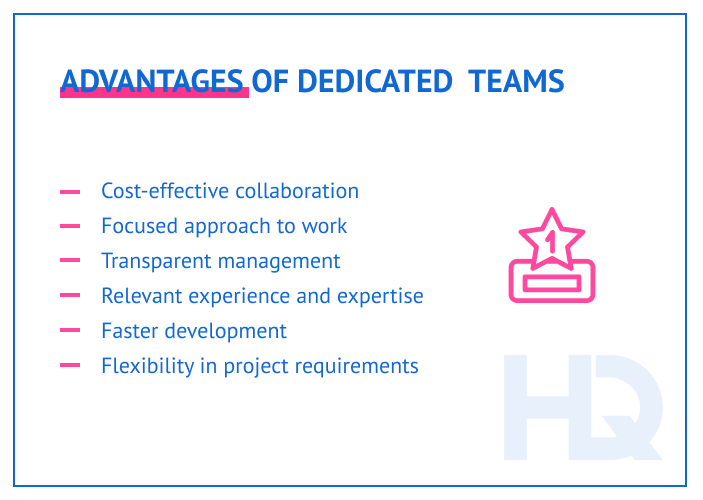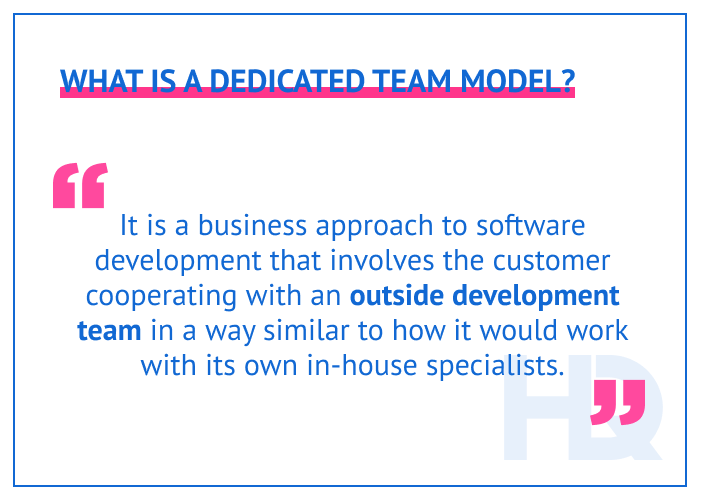Today, remote work is more popular than ever. The IT industry, which has always been a pioneer in building distributed teams and establishing remote work, is now probably the largest industry making full use of outsourcing.
In 2019, the global market size of outsourced services was $92.5 billion and outsourcing continues to grow. Its total market value is expected to hit $525.2 billion by 2030.
One of the major drivers of such growth is outsourcing companies that build and provide Dedicated Teams.
Let’s start by providing a Dedicated Development team definition.
What is a Dedicated Team Model?
A Dedicated Team model is a business approach to software development that involves the customer cooperating with an outside development team in a way similar to how it would work with its own in-house specialists.
To work with such a team, a business usually turns to a software development vendor that, in turn, acts as a middleman, finding suitable employees to build a Dedicated Team.
The main objective of a Dedicated Team is to work as an integral part of the client’s business and build a certain software product. Typically, this team compensates for the lack of internal resources of the customer.
Now that we have defined what’s meant by a dedicated development team, let’s dig deeper into how such teams work.
-
What is a dedicated team model?
How Do Dedicated Teams Work?
Collaboration between the dedicated project team and the customer follows several steps:
- Discuss the requirements. First, the customer determines project requirements and decides on expectations. A Business Analyst from the vendor’s side can help analyze the business needs of the customer and align project requirements with them. Then, the vendor can assess what team composition best fits the upcoming project and can create a personalized proposal and project estimate.
- When everything has been discussed and set down, the vendor assembles a Dedicated Team that will work on the project. The team may be composed of current employees, or talent may be hired specifically for the project.
- The gathered team starts working as a complement to the customer’s business.
From there, the customer has full control over the project and the team, all deliverables, budget, schedule, and so on. The team’s main objective and focus is delivering the best possible results.
This ability to focus on the project and dedication to the business objectives of the client is what makes the dedicated team model one of the most efficient collaboration methods.
What is the best-suited structure for development teams?
Usually, a dedicated project team is composed of:
- a Project manager, who controls the work of the whole team as well as deliverables, schedule, and budget;
- Business analysts, who analyze the business needs of the customer and consult on the best development strategies, features, and tech decisions;
- Developers, who execute the project development itself;
- Quality Assurance specialists and testers, who ensure that the solution is bug-free and works as intended;
- UX/UI designers, who think through the interface and appearance of the solution;
- If required, other specialists such as DevOps or architects may also be included as Dedicated Team members.
This is how the best-suited structure for development teams is constructed.
Let’s take a look at the advantages of having a Dedicated Team.
Advantages of Dedicated Teams
A Dedicated Team model offers many advantages in terms of collaboration with businesses. Here are some of the most important.

Cost-effective collaboration
If you decide to hire a team of developers in-house, you may be shocked by the costs and salaries.
How much does it cost to hire a software developer?
For example, a senior developer from the USA charges around $65 per hour. Now imagine that you need a full team of seasoned specialists, including a business analyst, a project manager, a UX/UI designer, and maybe some other workers.
Hiring all of them in-house is extremely expensive and adds additional costs for onboarding, benefits, and so on. If some developers go on vacation or get sick, it’s your problem to handle. Again, you’ll incur extra expenses if you need to replace a team member.
Focused approach to work
A dedicated project team works as an integral part of the customer’s business, just like in-house employees.
This guarantees that the team is as dedicated to the project as the company’s own employed specialists. They are focused on delivering excellent results, caring about the project as though it was their own.
A Dedicated Team model typically involves a Project Manager who controls all processes, letting the team focus on development.
Transparent management
An open and transparent relationship with a customer is also one of the most important advantages of the Dedicated Team model.
The customer has full control over all development processes and knows exactly what their team is doing at any given time. All processes are transparent, thanks to using management solutions such as Jira.
Relevant experience and expertise
All members of Dedicated Teams are hand-picked to meet the requirements of the project.
Usually, a vendor first picks relevant employees with suitable skills and experience, and the customer conducts interviews to determine if these specialists are a good fit. Sometimes businesses transfer all member-picking responsibilities to the vendor if they don’t want to waste time on interviewing.
If the vendor does not have a particular type of specialist employed, they will hire one specifically for your project.
Faster development
Having a dedicated project team working on your project exclusively will result in faster development. As mentioned earlier, the team is focused on your project alone and cares only about the quality of deliverables.
In-house employees often have a ton of other tasks to complete and usually work on a bunch of projects at the same time. This prevents them from focusing solely on one task and delays completion of the development.
Flexibility in project requirements
Even the best-thought-out project requirement may change, and both businesses and vendors have to be ready for this. To mitigate risks and be ready for changes, businesses hire Dedicated Development Teams.
In long-term projects, anything might change, from technical requirements to budget and personal preferences, and Dedicated Teams can provide enough agility in terms of tolerating changing project requirements.
Customers can rearrange the structure of the team, change task priority, and expand the tech stack according to new requirements easily.
So, when customers ask us “what is the best-suited structure for development teams?” we always, without hesitation, say it’s dedicated teams.
To ensure that a Dedicated Team model suits your business, let’s discuss the situations where this is the best type of collaboration.
When to Hire a Dedicated Team
Here are some criteria for the most efficient collaboration with Dedicated Teams.
Large and complex projects
When it’s a project that requires extra attention to detail and will probably last a long time, a Dedicated Team model is the perfect fit.
Whether you are an established business or a promising startup, a long-term project needs extra dedication and a team that is able to work on it consistently for months and sometimes for years. For these purposes, a Dedicated Team is a perfect choice.
Changing requirements
As we have already mentioned, a Dedicated Team is capable of handling changing requirements without compromising the final quality of the product.
For long-term projects, this is especially relevant — business goals, target market, and required functionality of the product might change. And for this reason, you need a truly flexible approach to software development.
Also note that, unlike an in-house team, you can rearrange your Dedicated Team so that it caters to the new requirements.
Hand-picked seasoned Dedicated Teams at your serviceHQSoftware has a team of skilled professionals ready to tackle the project. Let’s talk!
Julia Tuskal
Head of Sales
at HQSoftware
Need for extra dedication
Hiring a Dedicated Team means that you get a team of hand-picked developers that suit your business goals and project goals completely and that this team will be working only on this specific project.
As a bonus, you don’t have to worry about your team being distracted by other tasks and issues happening inside your business. A Dedicated Team model provides 100% dedication to one project.
Need for comprehensive expertise
Today’s software development projects often require expert knowledge in several domains and technologies simultaneously.
For example, a simple website requires back-end and front-end developers working shoulder-to-shoulder, accompanied by UX/UI developers and other specialists.
If a business, for example, hires freelancers to build a website, they usually find themselves dealing with niche-oriented specialists that focus on one or two technologies and work for one domain. Finding the right developer and further building a decent team takes a lot of time.
How to solve this riddle? Hire a Dedicated Team that is already packed with required developers with relevant expertise and tech stack experience.
Liability and security as a top priority
If you especially value these two factors, then definitely try a Dedicated Team model.
One of the strongest points of working with dedicated developers is their high reliability when it comes to working with sensitive business data.
It is a priority for a team to keep data security on a high level and never let the project specs get into the wrong hands. Usually, software development vendors that provide such teams sign a contract that states that they will keep all your information and confidential data secret. Such a company cannot vanish overnight, as freelancers sometimes do, and will do its utmost to fulfill its commitments.
But what about other models? Isn’t there something close or even better than Dedicated Teams?
Let’s find out.
Dedicated Teams vs Other Models
There are other collaboration models by which businesses can work with software development vendors. We will compare Dedicated Teams with two other efficient options: Time and Material and Fixed Price models.
Here’s a comparison table.
| Dedicated Team | Fixed Price | Time and Material | |
| When to hire |
|
|
|
| Project budget and duration | Both flexible, usually | Both fixed | Both flexible |
| Control over the process | Full control | Little control | Significant control |
| Methodology | Agile | Waterfall | Agile |
| Requirements | Usually changing; some may be strictly defined | Strictly defined | Changing |
Wrap Up: Is the Dedicated Team Model Right for Your Business?
See for yourself. A Dedicated Team model seems to be the most agile and adjustable to any software development project with any tech scope and requirements.
It’s especially important to choose such a collaboration model when:
- Your project will probably take more than a few months to complete.
- The requirements for tech stack, project composition, and functionality may change.
- You need a team that will be fully committed to one project only.
Ready to hire a Dedicated Team? Contact us for a personal consultation!

Head of Production
To ensure the outstanding quality of HQSoftware’s solutions and services, I took the position of Head of Production and manager of the Quality Assurance department. Turn to me with any questions regarding our tech expertise.
Frequently Asked Questions
What’s special about the dedicated team model?
What is the most important information to gather when choosing a Dedicated Teams provider?
Who needs a Dedicated Team?
What is the process of hiring a Dedicated Team?
Related Posts
View All
We are open to seeing your business needs and determining the best solution. Complete this form, and receive a free personalized proposal from your dedicated manager.

Sergei Vardomatski
Founder







